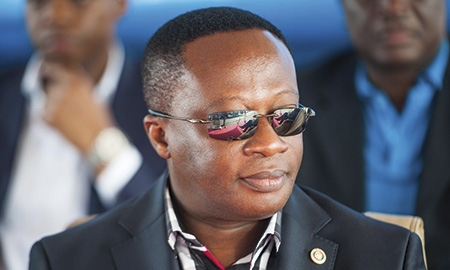At the Meltwater Entrepreneurial School of Technology in Accra, hopeful business owners come to pitch their dreams. The school provides seed funding and hands-on support, but perhaps most importantly, a community that nurtures innovative ideas. Ghana’s emergence as a middle-income nation can best be encapsulated by this budding scene, which has produced world-class technology start-ups. A maturing market and steady investment in human capital has brought forth a generation of entrepreneurs who are pushing various sectors of the economy into new territory.
“Over the years, Ghana has been focused on training people,” says Felix Nyarko-Pong, CEO of
Unibank. “If you go to our universities, they are very renowned in business studies, apart from the fact that many of us have had the benefit of Western education. So you also have a sector with the requisite levels of know-how and manpower. If you put all this together, you can then understand why the sector is really doing well, on a very sustainable basis.”
"It is playing a tremendous role in financial service delivery. Unibank has Uninet and we have mobile phone banking, internet banking and we are also linked with Airtel, one of the major telcos in the country, offering what is known as ‘mobile money’”
FELIX NYARKO-PONG,
CEO of Unibank
-------------------------------------
"This is a finance
business, The deals have to be bankable, so you have to work with financial institutions that are willing to take the risk and are trusting in the players. So we are looking for players that really know what they are doing”
ALEXANDER MOULD
CEO of Ghana National Petroleum Corporation (GNPC) |
The newly elected government has adopted an “ambitious transformation agenda centered on economic diversification, social inclusion and job creation,” according to the International Monetary Fund. While traditionally known as one of the world’s largest cocoa producers, and Africa’s second most important miner of gold, Ghana has a thriving services sector that now accounts for half of its $90-billion per year economy. “We have such a diversified economy,” adds Mr. Nyarko-Pong. “Countries will get into oil, and then the next moment it is all about oil. We have not gone down that route. We are still involved in gold, cocoa and timber, in addition to oil. Even tourism. This diversification brings with it the stability of growth and sustainability.”
From the well-heeled professionals strolling through Accra’s central business district, to the families running micro-enterprises in the country’s rural northern area, Ghana’s newly-acquired middle-income status has instilled a sense of possibility in its people. “Ghana is going to be very different,” says Alex Mould, CEO at Ghana National Petroleum Corporation. “You have local entrepreneurs who are developing their own franchises. So you don’t have only foreign investors, you have also Ghanaians who are investing in Ghana. That is a big change, because it demonstrates that Ghanaians are investing in Ghana because they believe in Ghana.”
With this expanding talent pool, the right public policies and participation from global enterprises, the economy has been able to delve deeper into value-added exports. “Ghana is known for its natural resources,” says Seth Emmanuel Terkper, Minister for Finance and Economic Planning. “It has gold, diamonds and oil. It has a strong agriculture industry. We want to add value to all those things.”
Mining is one area in which Ghana has grown increasingly sophisticated. “By adding value to our minerals, we create more jobs and more revenues,” says Dr. Toni Aubynn, CEO of the Ghana Chamber of Mines. “It is more about integrating our mineral resources with the economy. The opportunities are huge.”
“Value addition is the way to go,” says Inusah Abdulai B. Fuseini, Minister of Lands and Natural Resources. “Often, our raw minerals are shipped outside for refining. We want to do more than just export crude minerals. This increases the output and creates employment. It paves the way for technology transfer.”
An evolving business climate means that customers are demanding more and more in the way of financial services and banking. “With over 50% of the population still not financially included,” adds Mr. Nyarko-Pong, the CEO of Unibank, “with huge levels of money still outside of the banking system, there is no stopping the fact that there is a market out there and there are areas that have yet to benefit from the services we provide.”
In order to deliver these financial tools to consumers who will put them to use, Ghana’s Ministry of Finance has supported finance for small enterprises, as well as rural and mobile banking initiatives.
“The non-bank financial institutions are playing a wonderful role in microfinancing, supporting small businesses,” says Cassiel Ato Baah Forson, Deputy Minister of Finance and Economic Planning. “Rural banking is also doing well. In every economy, small businesses create the jobs. They should have more access to credit. It does not have to be big credit.”
In order to achieve his goal of diversifying the Ghanaian economy, President Mahama has given a top priority to fostering growth in the private sector, particularly among small and medium enterprises. “The government cannot do everything, adds Mr. Terkper. “We know how essential the private sector is. Ninety percent of investments in the continent come from the private sector.”
With a new generation awakening to a country full of opportunity, and with its rapidly-developing financial sector and growing middle class, Ghana’s leaders see their fortunes continuing to rise in the coming years. “When you put all of this together,” concludes Mr. Nyarko-Pong, “what better place is there?”

0 COMMENTS